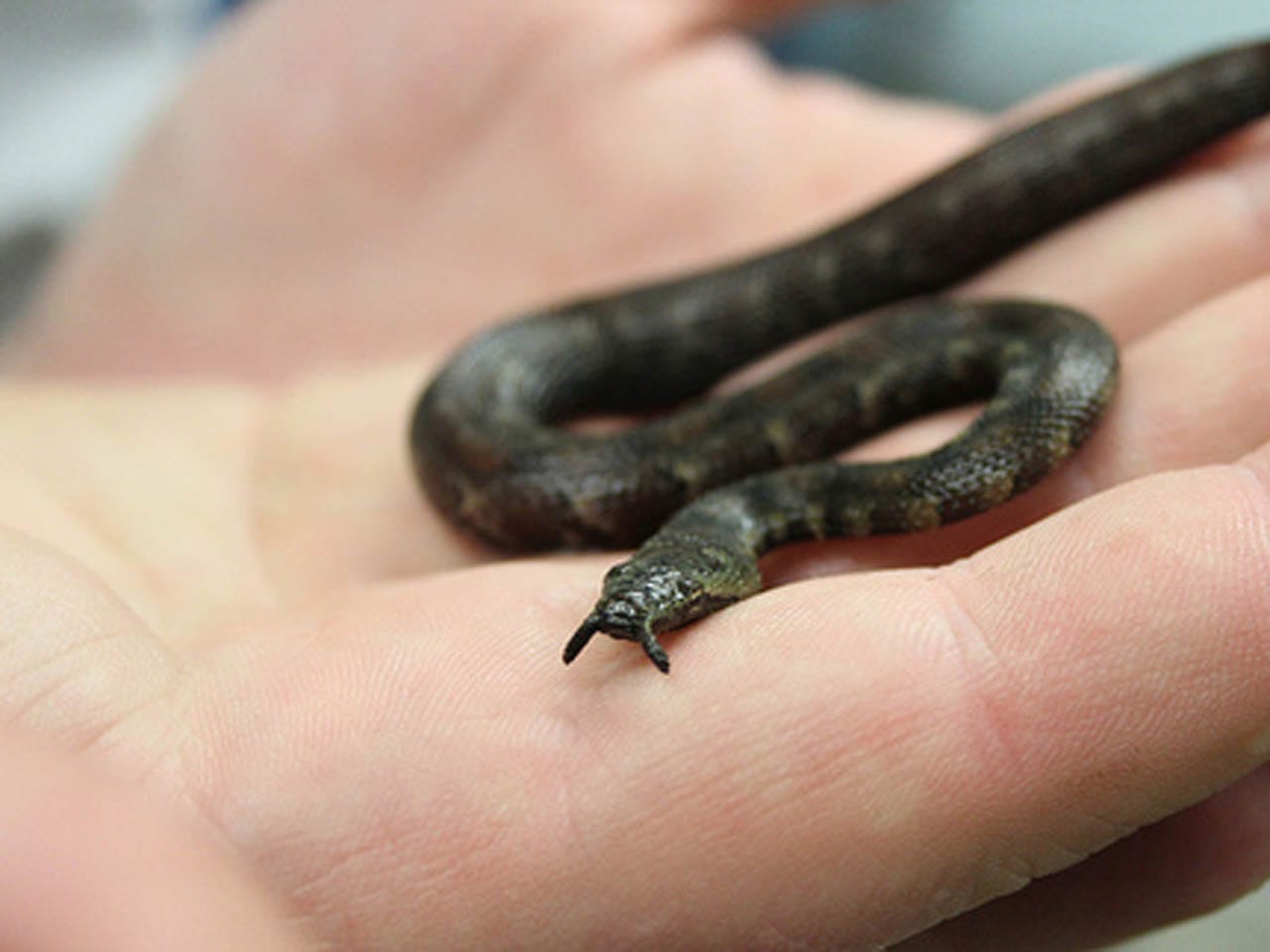Let’s plunge into the enigmatic world of the Tentacled Snake, an extraordinary creature that challenges our very notion of what a snake should be. Found in the murky waters of Southeast Asia, this serpent possesses a secret weapon: a pair of fleshy, highly-sensitive tentacles that protrude from its snout. Are these tentacles simply for show? Far from it! These remarkable adaptations act as a sixth sense, allowing the Tentacled Snake to detect prey with astonishing accuracy in the murky depths. Get ready to uncover the secrets of this captivating creature, from its mind-boggling hunting techniques to the crucial conservation efforts needed to protect this unique species.
Feeling the Vibes: The Role of the Tentacles
Imagine being able to sense the slightest ripple in the water, to feel the pressure changes caused by a fish swimming nearby. That’s precisely what the Tentacled Snake’s remarkable tentacles allow it to do. These are not your average, slimy tentacles; they’re covered in scales, just like the rest of the snake’s body, and are packed with specialized sensory cells. Scientists believe these cells are highly sensitive to minute changes in water pressure, giving the snake an almost supernatural ability to locate prey in water conditions where sight would be virtually useless.
The Art of the Ambush: A Master Predator in Action
The Tentacled Snake is a patient hunter, often suspending itself upside down near the water’s surface, perfectly still and camouflaged against the murky backdrop. It’s the ultimate ambush predator, waiting for an unsuspecting fish, frog, or crab to wander too close. Then, in a flash, it strikes with incredible speed and precision.
But the element of surprise isn’t the Tentacled Snake’s only weapon. Research suggests these snakes can actually predict the escape route of their prey. Using their tentacles to gather information about the direction and speed of movement, they launch themselves with pinpoint accuracy, intercepting their prey before it even realizes what’s happening.
Venom: A Secondary Weapon
While the Tentacled Snake does possess venom, it’s relatively mild and primarily used to subdue its prey. Their fangs are located in the back of their mouths, making accidental bites to humans extremely rare. In fact, Tentacled Snakes are generally considered docile creatures and are more likely to retreat than to strike when encountered by humans.
Family Matters: A Life Submerged
The Tentacled Snake’s aquatic lifestyle extends even to the way they reproduce. Unlike many snake species that lay eggs, Tentacled Snakes give birth to live young underwater. These miniature serpents emerge ready to hunt, inheriting their parents’ incredible abilities from the moment they’re born.
Protecting a Unique Hunter
Sadly, like many species in our world today, the Tentacled Snake faces threats to its survival, primarily from habitat loss due to pollution, deforestation, and the conversion of wetlands for agriculture. Protecting these captivating creatures and their freshwater habitats is crucial, not only for their own sake but also for the health of the delicate ecosystems they are part of.
The Tentacled Snake: A Testament to Nature’s Ingenuity
The Tentacled Snake, with its unique blend of serpentine grace and almost otherworldly tentacles, embodies the incredible diversity and wonder of our planet. They are a testament to the power of evolution, showcasing the extraordinary ways in which life has adapted to thrive in even the most challenging environments. As we continue to study these mysterious creatures, we gain a deeper appreciation for the interconnectedness of life on Earth and the importance of protecting the delicate balance of nature.
Is there a snake with tentacles?
You bet there is! We’re talking about the Tentacled Snake, a creature that breaks all the “typical snake” stereotypes. Found slithering—or perhaps more accurately, swimming—around Southeast Asia, these guys are like the aquatic ninjas of the snake world.
Now, let’s talk about those tentacles. Imagine two little feelers, right on their snouts. These aren’t just for show; they’re like extra senses underwater. Picture this: a fish swims by, causing tiny ripples and pressure changes. The Tentacled Snake picks up on this with its super-sensitive tentacles, giving them a heads-up before the fish even knows what’s coming.
Speaking of surprises, these snakes are ambush predators. They’ll hang out in the water, blending in, waiting for a tasty fish, frog, or crab to wander by. Then, BAM! A blur of movement, and the unsuspecting prey is caught in their lightning-fast strike.
While they do have a bit of venom, it’s more like a backup plan. Their main weapons are their speed and hunting smarts. They’re not just randomly striking; they actually seem to predict where their prey will move. It’s like they’ve got a sixth sense for underwater hunting.
So, are there snakes with tentacles? Absolutely! The Tentacled Snake is a perfect example of how diverse and fascinating nature can be. They’ve adapted to their watery world in the most incredible way, reminding us that there’s always something new to discover in the animal kingdom.
Want to know more about another creature that challenges our understanding of the natural world? Check out the Titicaca frog, a species that dwells in the depths of the highest lake on Earth. And while you’re at it, don’t miss the silkie chicken meat, prized for its unique appearance and purported medicinal properties.
Tentacled Snake Breath-Holding: How Long Can They Stay Underwater?
We already know these Tentacled Snakes are pretty awesome, hanging out in Southeast Asia and rocking those cool tentacles on their snouts. But how do they breathe underwater? As it turns out, these reptiles don’t have gills like fish. Instead, they rely on their lungs, just like us!
Now, you might be wondering, how long can they possibly hold their breath? Well, get ready to be amazed! These slippery serpents can stay submerged for a whopping 30 minutes! That’s right, half an hour without coming up for air. That’s probably longer than many of us can manage!
This amazing breath-holding ability plays a big part in their hunting style. Imagine this: a Tentacled Snake, perfectly still, lurking in the water. They spend about 90% of their time like this, conserving their energy and making the most of that impressive lung capacity.
But don’t be fooled by their apparent laziness. They are actually expert ambush predators. Those cool tentacles we talked about? They’re not just for show. They’re incredibly sensitive to even the tiniest vibrations in the water, like a fish swimming by. This gives them a sixth sense, allowing them to anticipate their prey’s movements. And when the moment is right, BAM! They strike with lightning speed, snatching their unsuspecting meal.
But hold on, there’s even more to these fascinating creatures. While they are definitely water lovers, did you know they can also survive on land? If things get a bit dry, or when night falls, they can burrow into the mud. This just goes to show how adaptable they are, comfortable both in and out of the water.
The Ultimate Guide to Tentacled Snake Care: Habitat, Diet & More
Okay, so you’re thinking about welcoming a Tentacled Snake into your home? That’s awesome! These guys are like something straight out of a sci-fi movie with those crazy tentacles on their face. But before you jump in, let’s talk about how to make sure your tentacled buddy thrives.
Setting Up Their Crib (We Mean Tank!)
Think of it this way – your Tentacled Snake is used to cruising around the warm, tropical waters of Southeast Asia. You’ve got to recreate that cozy environment as best as you can. First things first, they need their space. A 20-gallon tank is the absolute minimum you should consider for one snake. Got a bigger tank? Even better! Just like us, they appreciate a little extra room to stretch out.
Now, about that water. Tentacled Snakes are picky about their water temperature. Think balmy, like a relaxing bath – somewhere between 75 to 82°F. You’ll also need a good filter. Imagine living in a pool that’s never cleaned – yuck! An aerator is key too, keeping the water oxygenated for your aquatic pal.
Pro Tip: Use a water conditioner to remove chlorine and chloramines, which can be harmful to your snake.
Dinner Time!
Let’s get one thing straight – Tentacled Snakes are all about that fishy life. We’re talking strictly fish, no exceptions! They’re what scientists call “obligate piscivores,” meaning they simply can’t digest anything else. Think of them as the ultimate fish connoisseurs. So, what’s on the menu? Live feeder fish are the way to go. Betas, rosy barbs, and guppies are all good options. How much you feed them depends on their size and age. But as a general rule of thumb, aim for around 20-30 small fish (about 2 inches each) per week.
Important Note: Avoid feeding goldfish as they can be high in thiaminase, an enzyme that can deplete vitamin B1 in your snake.
Handling With Care (and Respect!)
Tentacled Snakes are generally pretty chill customers. They’d rather hang out in their watery domain than cause a fuss. But remember, they’re still wild animals with instincts. If they feel threatened, they might bite. And honestly, can you blame them?
So, how should you handle them? With caution and only when absolutely necessary. When you do need to pick them up, make sure to support their entire body, especially their head. Think gentle cradling, not squeezing!
Expert Tip: Always wash your hands thoroughly before and after handling your snake to prevent the spread of germs.
Keeping Your Snake in Tip-Top Shape
For the most part, Tentacled Snakes are pretty hardy creatures. But just like us, they can get sick if their environment isn’t clean or if their diet isn’t right. Respiratory infections, skin nasties, and pesky parasites are some things to watch out for. Regular check-ups with a vet who specializes in reptiles are crucial. Think of it like taking your snake for an annual physical – it’s all about preventative care!
Signs of a Healthy Tentacled Snake:
- Active and alert
- Clear eyes and skin
- Regular feeding and shedding
- Normal swimming behavior
Key Things to Remember about Tentacled Snakes
- Fascinating to Observe: Owning a Tentacled Snake is like having a piece of the Amazon rainforest in your living room!
- Space is Key: The bigger the tank, the happier your snake.
- Strict Fish Diet: Nothing else will do!
- Handle with Care: Respect their space.
- Regular Vet Visits: Just like any other pet, they need check-ups.
Owning a Tentacled Snake is a big responsibility, but it’s also incredibly rewarding. They’re one-of-a-kind creatures that can teach us a lot about the natural world. By providing the right care and environment, you can ensure your Tentacled Snake lives a long and healthy life.
- Crypto Quotes’ Red Flags: Avoid Costly Mistakes - June 30, 2025
- Unlock Inspirational Crypto Quotes: Future Predictions - June 30, 2025
- Famous Bitcoin Quotes: A Deep Dive into Crypto’s History - June 30, 2025

















2 thoughts on “The Tentacled Snake: Unveiling the Southeast Asian Super-Hunter”
Comments are closed.